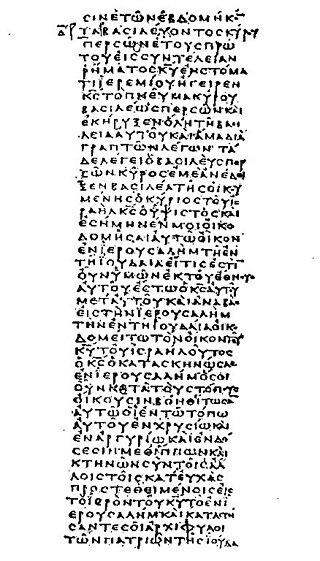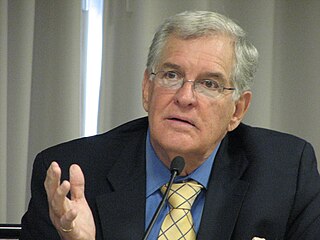Related Research Articles

The Septuagint, sometimes referred to as the Greek Old Testament or The Translation of the Seventy, and often abbreviated as LXX, is the earliest extant Greek translation of the Hebrew Bible from the original Hebrew. The full Greek title derives from the story recorded in the Letter of Aristeas to Philocrates that "the laws of the Jews" were translated into the Greek language at the request of Ptolemy II Philadelphus by seventy-two Hebrew translators—six from each of the Twelve Tribes of Israel.

The Dead Sea Scrolls, also called the Qumran Caves Scrolls, are a set of ancient Jewish manuscripts from the Second Temple period. They were discovered over a period of 10 years, between 1946 and 1956, at the Qumran Caves near Ein Feshkha in the West Bank, on the northern shore of the Dead Sea. Dating from the 3rd century BCE to the 1st century CE, the Dead Sea Scrolls include the oldest surviving manuscripts of entire books later included in the biblical canons, along with extra-biblical and deuterocanonical manuscripts from late Second Temple Judaism. At the same time, they cast new light on the emergence of Christianity and of Rabbinic Judaism. Almost all of the 15,000 scrolls and scroll fragments are held in the Shrine of the Book at the Israel Museum, located in the city of Jerusalem. The Israeli government's custody of the Dead Sea Scrolls is disputed by Jordan and the Palestinian Authority on territorial, legal, and humanitarian grounds—they were mostly discovered following the Jordanian annexation of the West Bank and were acquired by Israel after Jordan lost the 1967 Arab–Israeli War—whilst Israel's claims are primarily based on historical and religious grounds, given their significance in Jewish history and in the heritage of Judaism.

The Book of Jubilees is an ancient Jewish apocryphal text of 50 chapters, considered canonical by the Ethiopian Orthodox Tewahedo Church, as well as by Beta Israel. Jubilees is considered one of the pseudepigrapha by the Eastern Orthodox, Catholic, and Protestant churches. Apart from the Beta Israel community, the book is not considered canonical within any of the denominations of Judaism.
The oldest surviving Hebrew Bible manuscripts, the Dead Sea Scrolls, date to c. the 2nd century BCE. Some of these scrolls are presently stored at the Shrine of the Book in Jerusalem. The oldest text of the entire Bible, including the New Testament, is the Codex Sinaiticus dating from the 4th century CE, with its Old Testament a copy of a Greek translation known as the Septuagint. The oldest extant manuscripts of the vocalized Masoretic Text date to the 9th century CE. With the exception of a few biblical sections in the Nevi'im, virtually no biblical text is contemporaneous with the events it describes.

The Book of Enoch is an ancient Jewish apocalyptic religious text, ascribed by tradition to the patriarch Enoch who was the father of Methuselah and the great-grandfather of Noah. The Book of Enoch contains unique material on the origins of demons and Nephilim, why some angels fell from heaven, an explanation of why the Genesis flood was morally necessary, and a prophetic exposition of the thousand-year reign of the Messiah. Three books are traditionally attributed to Enoch, including the distinct works 2 Enoch and 3 Enoch. None of the three are considered to be canonical scripture by most Jewish or Christian church bodies.
Pseudo-Philo is the name commonly used for the unknown, anonymous author of the Biblical Antiquities. This text is also commonly known today under the Latin title Liber Antiquitatum Biblicarum, a title that is not found in the Latin manuscripts. Although probably originally written in Hebrew, it is preserved today only through a Latin translation found in 18 complete and 3 fragmentary manuscripts that date between the eleventh and fifteenth centuries CE. In addition, material paralleling that in the Biblical Antiquities is also found in the Chronicles of Jerahmeel, a 14th-century Hebrew composition. The Latin text of the Biblical Antiquities circulated alongside Latin translations of the authentic writings of Philo of Alexandria. Scholars have long recognized the pseudonymous character of the text now known as the Biblical Antiquities. Primary in this regard is a vastly differing approach to and use of the Jewish scriptures. For the sake of convenience, scholars continue to follow the lead of Leopold Cohn in calling the unknown author "Pseudo-Philo".
The Prayer of Manasseh is a short, penitential prayer attributed to king Manasseh of Judah.
Psalm 151 is a short psalm found in most copies of the Septuagint (LXX), but not in the Masoretic Text of the Hebrew Bible. The title given to this psalm in the Septuagint indicates that it is supernumerary, as no number is affixed to it. The psalm is ascribed to David. It is also included in some manuscripts of the Peshitta. The psalm concerns the story of David and Goliath.
One of the apocryphal books, the Psalms of Solomon is a group of eighteen psalms written in the first or second centuries BC that are not part of any current scriptural canon.
Lawrence Harvey Schiffman is a professor at New York University ; he was formerly Vice-Provost of Undergraduate Education at Yeshiva University and Professor of Jewish Studies. He had previously been Chair of New York University's Skirball Department of Hebrew and Judaic Studies and served as the Ethel and Irvin A. Edelman Professor in Hebrew and Judaic Studies at New York University (NYU). He is currently the Judge Abraham Lieberman Professor of Hebrew and Judaic Studies at New York University and Director of the Global Institute for Advanced Research in Jewish Studies. He is a specialist in the Dead Sea Scrolls, Judaism in Late Antiquity, the history of Jewish law, and Talmudic literature.

Joseph and Asenath is a narrative that dates from between 200 BCE and 200 CE. It concerns the Hebrew patriarch Joseph and his marriage to Asenath, expanding the fleeting mentions of their relationship in the Book of Genesis. The text was translated widely, including into Amharic, Arabic, Armenian, Early Modern German, Latin, Middle English, Old French, Romanian, Serbian and Syriac.

James Hamilton Charlesworth is an American academic who served as the George L. Collord Professor of New Testament Language and Literature until January 17, 2019, and Director of the Dead Sea Scrolls Project at the Princeton Theological Seminary. His research interests include the Apocrypha and Pseudepigrapha of the Hebrew and Christian Bibles, the Dead Sea Scrolls, Josephus, the Historical Jesus, the Gospel of John, and the Book of Revelation.
Discoveries in the Judaean Desert (DJD) is the official 40-volume publication that serves as the editio princeps for the Dead Sea Scrolls. It is published by Oxford University Press.
Ashrei is a prayer that is recited at least three times daily in Jewish prayers, twice during Shacharit and once during Mincha. The prayer is composed primarily of Psalm 145 in its entirety, with Psalms 84:5 and Psalms 144:15 added to the beginning, and Psalms 115:18 added to the end. The first two verses that are added both start with the Hebrew word ashrei, hence the prayer's name.
"They have pierced my hands and my feet", or "They pierced my hands and my feet" is a phrase that occurs in some English translations of Psalm 22:16.
Loren T. Stuckenbruck is a historian of early Christianity and Second Temple Judaism, currently professor of New Testament at the University of Munich, in Germany. His work has exerted a significant impact on the field.
11Q13, also 11QMelch or the Melchizedek document, is a fragmentary manuscript among the Dead Sea Scrolls which mentions Melchizedek as leader of God's angels in a war in Heaven against the angels of darkness instead of the more familiar Archangel Michael. The text is an apocalyptic commentary on the Jubilee year of Leviticus 25. The Dead Sea Scrolls contain texts in Hebrew, Aramaic and Greek, the language of 11Q13 is Hebrew, date of composition is circa 100 BCE.
The Great Psalms Scroll, also referred to as 11Q5, is the most substantial and well preserved manuscript of Psalms of the thirty-seven discovered among the Dead Sea Scrolls in the Qumran caves. It is one of six Psalms manuscripts discovered in Cave 11.

The manuscript 4Q127 is one of the Dead Sea Scrolls. It is probably a paraphrase of Exodus according to the Septuagint (LXX) of the biblical Book of Leviticus, found at Qumran. The Rahlfs-No. is 802. Palaeographically it dates from the first century BC. Currently the manuscript is housed in the Rockefeller Museum in Jerusalem.
References
- ↑ Herbert Edward Ryle; Montague Rhodes James, eds. (2014). Psalms of the Pharisees. Cambridge University Press. p. 161. ISBN 9781107623965.
- ↑ Delcor, M., Cinq Nouveaux Psaumes Esséniens?, Revue de Qumrân, Vol. 1, No. 1 (1) (July 1958), pp. 85-102 (in French)
- ↑ Charlesworth, J. H. (1982), The Pseudepigrapha and Modern Research, pp. 202-204, quoted at Early Jewish Writings, More Psalms of David, accessed 15 July 2022
- 1 2 3 Gurtner, Daniel (2020). Introducing the Pseudepigrapha of Second Temple Judaism. Grand Rapids, MI: Baker Publishing Group. pp. 335–340. ISBN 9781493427147.
- 1 2 3 4 Wright, W. (1887), 'Some Apocryphal Psalms in Syriac', Proceedings of the Society of Biblical Archaeology , 9, 257–266
- 1 2 3 4 James H. Charlesworth with James A. Sanders, More Psalms of David (Third Century B.C.-First Centiry A.D.). A New Translation and Introduction, in James H. Charlesworth (1985), The Old Testament Pseudoepigrapha, Garden City, NY: Doubleday & Company Inc., Volume 2, ISBN 0-385-09630-5 (Vol. 1), ISBN 0-385-18813-7 (Vol. 2), p. 609
- ↑ James H. Charlesworth (2010). The Old Testament Pseudepigrapha. Hendrickson Publishers. p. 615. ISBN 978-1-59856-490-7.
The original language of this psalm, which is extant only in Syriac, may be Hebrew... It is impossible to date this psalm. The general tone, Jewish but non-rabbinic character, and association with Psalms 151, 154 and 155 indicate that it was probably composed by a Palestinian Jew during the hellenistic period.
- ↑ "מגילת שירי מגילות תהלים | מפעל המילון ההיסטורי". maagarim.hebrew-academy.org.il. Retrieved 2022-12-07.
- ↑ A. Chadwick Thornhill (2015). The Chosen People: Election, Paul and Second Temple Judaism. InterVarsity Press. p. 31. ISBN 978-0-8308-9915-9.
Prior to their discovery at Qumran, the additional psalms of David survived primarily through Syriac copies, and scholars referred to them as Syria noncanonical psalms. Of these psalms, Psalms 151A, 151B and 155 are present within the Qumran Psalms Scroll (11QPsa), and are thus clearly pre-Christian in their composition.